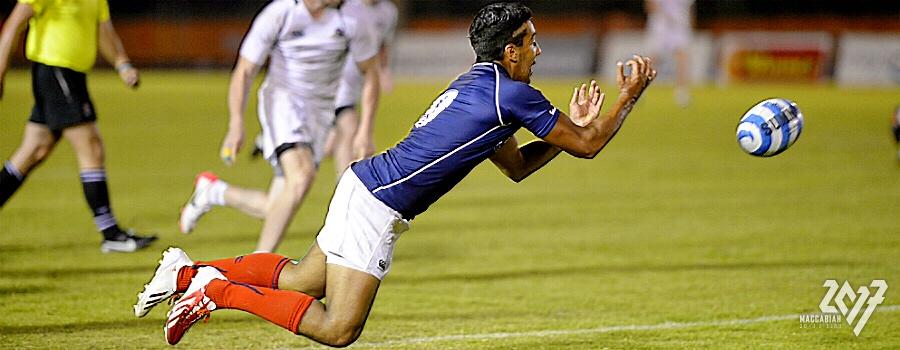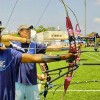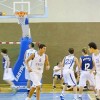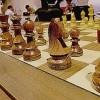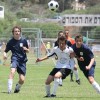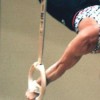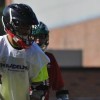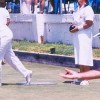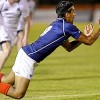Rugby 7
RUGBY REGULATIONS
Last update 12/03/27
1. Organization
a. The Rugby Committee of the 20th Maccabiah will be responsible for the Rugby competition of the 20th Maccabiah, subject to the approval of the MWU Sports Department and the ISC.
b. The Rugby competition will be conducted according to the rules of the International Rugby Board (I.R.B.), the English text will be binding.
c. Participation in the Competition is open to any athlete who is in possession of a Participant card, issued by the Organizing Committee of the 20th Maccabiah and registered the Rugby competitions.
d. Each country may enter one team in the Rugby Open and Juniors 15's competition. Each country may enter one team in the Open and Juniors 7's competition. For MWU registration purposes, all 15’s and 7’s players and coaches will be registered under “Rugby.”
e. Each 15s team may consist of a maximum of 26 players. Each 7s team may consist of a maximum of 12 players. A country may register completely separate teams in the 15s competition and in the 7s competition, with the aforementioned roster limits. A country may elect to enter teams in the 15s and 7s competitions and utilize crossover players. A “crossover” player is a player who is on the 15s AND 7s rosters (There may be up to 12 crossover players – the maximum 7s roster size). The 15s team roster limit may be increased by one for each “crossover” player, up to a maximum 15s roster limit of 30. A country which enters both 15s and 7s teams utilizing “crossover” players must timely indicate the entry of its 7s team in the relevant MWU entry forms. All crossover players must be listed on their respective 7’s team’s official form which must be submitted with entry form #3. No team can change its list of players on the official form after it has been submitted prior to the commencement of the relevant competition.
Remark: It is intended that no competitive advantage be given to a 7s team whose country also enters a 15s team, by utilizing a larger player pool. This is why all “crossover” players must be designated on the roster before the 7’s tournament begins, and the roster may not be changed during the tournament. However, “crossover” players from 15’s teams must be listed as part of Entry Form #3.
2. Venues and Times
a. The Rugby Committee of the 20th Maccabiah will determine the venues and times of the Rugby competition and teams will be notified accordingly.
b. The Rugby Committee is authorized to change the venues and times of the competitions. These decisions will be final.
3. Game Ball
a. The games will be played with RHINO balls. Logo:
b. The Rugby Committee is authorized to change the type of balls, if necessary, but only with prior approval of the Sports Department.
4. Systems of Competition
PREFACE; As Rugby is a body contact sport, it is imperative that there is at least a one day break between 15s games, and more if possible.
Guide to Systems of Competition:
Juniors 7s: Juniors 15s:
3 teams – System A 3 teams – System A
4 teams – System B 4 teams – System B
5 teams – System B 5 teams – System C
6 teams – System D 6 teams – System D
7 teams – System E 7 teams – System E
Open 7s: Open 15s:
4 teams – System B 4 teams – System B
5 teams – System B 5 teams – System C
6 teams – System D 6 teams – System D
7 teams – System E 7 teams – System E
SYSTEM A:
a. If there are three Juniors 15s teams, there will be a preliminary single round robin competition, with each team playing all others, once. Then, see paragraph “k,” herein.
b. If there are three Juniors 7s teams, there will be a double round robin competition, with each team playing all others, twice. The final placement of teams will be determined by the total points earned by each team in the double round robin competition, and tiebreakers, if necessary.
c. The order of games will be determined by a blind draw.
d. The winning team will score 3 league points, the loser none. In the event of a draw each team will score 1 league point.
e. The team which accumulates the most league points will take first place and the other teams will be placed according to the number of league points gained.
f. If the number of league points achieved by two or more teams is equal, then the team which won the head to head game(s) against the other team with the same number of league points will take the higher place.
g. If the result of the head to head game(s) does not break the tie, then the team with the higher game point difference will take the higher place.
h. In the event of equality, both in the number of league points and game points difference, the number of tries scored will decide, i.e., the team scoring the larger number of tries will take the higher place in the table.
i. In the event that equality still persists, the higher placing will be taken by the team with the higher number of game points.
j. In the event that equality still persists, after all the above described, then the teams will be placed by a draw.
k. In 15s, the teams placed 1 and 2 after the preliminary round will compete for the Gold and Silver medals.
l. In any 15s semifinal or medal game, if after regulation time the game is not decided, it will be extended for another 2 x 10 minutes, following an intermission of 5 minutes.
m. In any 7’s semifinal or medal game, if after 14 minutes the game is not decided, it will be extended, following a 3 minute intermission, until a team scores. The first team that scores will be declared the winner (sudden death). If no team scores in the first 7 minute sudden death period, there will be a 1 minute intermission followed by another 7 minute sudden death period.
n. If after extension of time, the game is still undecided, then the result will be determined by 5 alternate 30 meter penalty kicks by each team from straight in front of the poles. Lots will be drawn to decide which team will kick first.
o. Only those players who have actually participated in the game when it ended will be entitled to participate in the 30 meter kicks. Each 30 meter kick will be taken by a different player.
p. The team scoring the highest number of conversions will be the winner.
q. If the game is still undecided after the 5 penalty kicks, the teams will continue with the 30 meter alternate kicks until one team has scored one conversion more than the other team, out of an equal number of penalty kicks.
r. A player may kick a second time only after all the other players, entitled to participate in the kick have already kicked.
SYSTEM B:
a. If there are four or five Open or Juniors 7s teams, or four Open or Juniors 15s teams, there will be a preliminary single round robin competition, with each team playing all other teams once.
b. The provisions in paragraphs c – i and l - r in System A will apply to System B.
c. The teams placed 1 and 2 after the preliminary round will compete for the Gold and Silver medals.
d. The teams placed 3 and 4 after the preliminary round will compete for the Bronze medal.
e. The provisions in paragraphs l – q under System A will apply to System B.
SYSTEM C:
a. If there are five Open or Juniors 15s teams, there will be a preliminary round of competition, with each team playing two games. The two games will be determined by a blind draw.
b. The provisions of paragraphs c – i and l - r under System A will apply to all preliminary round games in System C.
c. In Juniors 15s and Juniors 7s, the teams placed 1 and 2 after the preliminary round will compete for the Gold and Silver medals.
d. In Juniors 15s and Juniors 7s, the teams placed 3 and 4 after the preliminary round will compete for the Bronze medal.
e. In Open 15s, after the preliminary round, there will be semifinal games. The team in first place will play the team in fourth place and the team in second place will play the team in third place.
f. In Open 15s, the winners of each semifinal game will play for the Gold and Silver medals.
g. In Open 15s, the losers of each semifinal game will compete for the Bronze medal.
h. The provisions of paragraphs l – q in System A will apply to System C.
SYSTEM D:
a. If there are six Open or Juniors 15s or 7s teams, then the teams will be divided into two groups of 3 teams (Group A and Group B) . In 15’s, the teams will be seeded and put into the two groups according to their places in the 19th Maccabiah. The two finalists will head the groups and the rest of the teams will be seeded in the serpentine system (ie. Group A will have seeds 1, 4 and 5. Group B will have seeds 2,3 and 6).. Teams which did not participate in the 19th Maccabiah, will be placed in a group based upon its final placement in the most recently past Maccabiah Games in which it participated. New, first-time entries will be seeded next after all teams which have previously participated. If there are more than one new first time entries, they will be divided into groups by a draw. In the event that one or more teams will not appear and a situation arises whereby a group is short of two teams, the team placed last will be moved from one group to another. In 7’s, the teams will be placed into the two groups by a public draw under the supervision of the Rugby Committee of the 20th Maccabiah, the MWU Sports Department and approval of the ISC.
b. There shall be a preliminary single round robin within each group. The teams in each group will play the two other teams in the same group, once.
c. The provisions of paragraphs c – i and l - r under System A will apply to System D.
d. After the preliminary round, there will be semifinal games. The team placed first in Group A will play against the team placed second in Group B and the team placed second in Group A will play against the team placed first in Group B.
e. The winners of each semifinal game will play for the Gold and Silver medals.
f. The losers of each semifinal game will compete for the Bronze medal.
g. The teams placed third in each group will play each other for 5th and 6th places.
h. The provisions of paragraphs l – q in System A will apply to System D.
SYSTEM E:
a. If there are seven Open or Juniors 15s or 7s teams, then the teams will be divided into two groups (Group A and Group B), one with 3 teams and one with 4 teams. In 15’s, the teams seeded 1 and 7, according to their places in the 19th Maccabiah (or new team), will be placed in Group A. The teams seeded 2 and 6, according to their places in the 19th Maccabiah (or new team), will be placed in Group B. The team seeded 3, as above, will be placed in Group A or B by a blind, public draw. The team seeded 4 will then be placed in the opposite group as the team seeded 3. After placement of teams seeded 3 and 4, the team seeded 5 will be placed in Group A or B by blind, public draw. The group in which the team seeded 5 is placed will be the group with four teams. Teams which did not participate in the 19th Maccabiah, will be placed in a group based upon its final placement in the most recently past Maccabiah Games in which it participated. New, first-time entries will be seeded next after all teams which have previously participated. If there are more than one new first time entries, they will be divided into groups by a draw. In the event that one or more teams will not appear and a situation arises whereby a group is short of two teams, the team placed last will be moved from one group to another. Preliminary Round: In the group with three teams, each team will play one game against the other two teams. In the group with four teams, the top two seeded teams will play the bottom two seeded teams. In 7’s, the teams will be placed into two groups (A and B). The gold medal winner from the 19th Maccabiah will be placed in Group A as the top seeded team and the silver medal winner from the 19th Maccabiah will be placed in Group B as the top seeded team. The remaining teams will be placed into Groups A and B by a public draw under the supervision of the Rugby Committee of the 20th Maccabiah, the MWU Sports Department and approval of the ISC. In the group with three teams, each team will play one game against the other two teams. In the group with four teams, each team will play two games against different teams, as determined by a public draw described above in this paragraph.
b. The provisions of paragraphs c – I and l – r of SYSTEM A will apply to SYSTEM E.
c. After the preliminary round, there will be semifinal games. The team placed first in Group A will play against the team placed second in Group B and the team placed second in Group A will play against the team placed first in Group B.
d. The winners of each semifinal game will play for the Gold and Silver medals.
e. The losers of each semifinal game will compete for the Bronze medal.
f. The teams placed third and fourth in the group with four teams will play each other. The winner will then play the team that placed third in the group with three teams for 5th and 6th places.
g. The provisions of paragraphs l – q in System A will apply to System E.
REMARK: In the 15s competition, the goal is to limit the competition to a maximum of four (4) games per team for the health and safety of the players. Should a team cease to play in the competition, or be suspended before the competition is completed, all scoring by the team will be cancelled and made invalid.
5. Players
a. Before the start of the tournament, each team will submit to the Rugby Committee officials a list of all of its players, on an official form. Before the start of each game, each team will give the referee a list of its players designated to play in the game.
b. In 15’s, a maximum of 26 players on the team may be registered for each game, with a maximum of 11 substitutes permitted (15 + 11). In 7’s, a maximum of 12 players on the team may be registered for each game, with a maximum of 5 substitutes permitted (7 + 5). All players must be pre-designated on the game roster. The number for each player listed on the game roster should be identical to the number marked on the shirts he is wearing. All players on the team may be in uniform and in the bench area during the game.
c. A player whose name does not appear on the official roster will not be permitted to play in the competition.
REMARK: The number of substitutes has been expanded for the health and safety of the players, and to add depth due to the combination of 15’s and 7’s competitions.
6. Duration of Game
a. In Open 15’s, there will be 2 x 40 minute halves, with an intermission of up to 10 minutes. In Juniors 15s (born 1999-2000), there will be 2 x 35 minute halves.
b. In 7’s, there will be 2x7 minute halves (including finals), with an intermission of 1 minute.
c. In order to avoid dehydration and heat stress it is in the discretion of the referee to stop the game every quarter (i.e. half-way into each half) for one minute, to enable players to drink water. Players are not permitted to leave the field during that period.
7. Referees
The Rugby Committee will select a Referees’ Committee, which in turn will appoint the referees of the competition, subject to the approval of the MWU Sports Department.
8. General
a. These regulations are but one part of the complete 20th Maccabiah Regulations, and must be read along with the instructions found in "Basic Regulations and Disciplinary Procedures".
b. In the event of a discrepancy between the regulations written here and those appearing in the "Basic Regulations", the regulations written here will apply and be binding.
PARTICIPATING COUNTRIES - Rugby 7
OPEN RUGBY 7'S : MALE
|
GROUP A |
GROUP B |
|
AUS |
FRA |
|
USA |
ISR |
|
RSA |
ARG |
JUNIORS RUGBY 7'S : BOYS
|
ARG |
|
RSA |
|
ISR |


